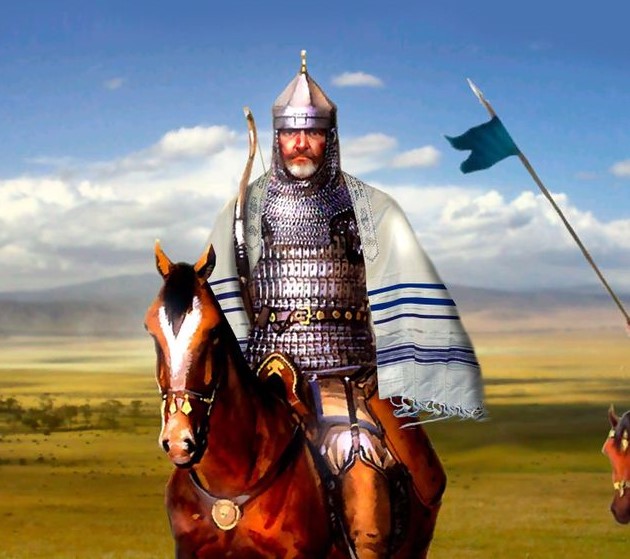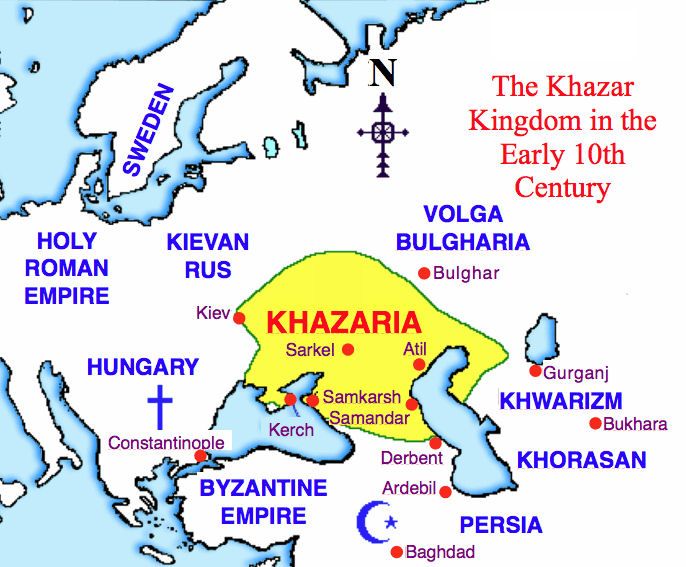 |
|
Khazar Soldier |
Hope of Israel Ministries (Ecclesia of YEHOVAH):
Forgotten Jewish History --
The Khazar Correspondence
|
"...there exist people under the sky in regions where no Christians can be found, whose name is Gog and Magog, and who are Huns; among them is one, called the Gazari, who are circumcised and observe Judaism in its entirety" (Christian Druthmar of Aquitania (864 A.D.)) |
by Jory Steven Brooks
In the early Middle Ages, word reached Jewish leaders in Cordoba, Spain, of a Jewish nation existing in the east in the kingdom of Khazaria. This kingdom was located on the north side of the Caucasus Mountains, and caused considerable excitement in the hope that these may have been the famous "Lost Ten Tribes" of the House of Israel, exiled in 721 B.C. to northern Assyria (2 Kings 17:6) just on the south side of the Caucasus and lost to history.
 |
|
Khazar Soldier |
Jewish historian Arthur Koestler pointed out that "The Caucasus was a formidable natural obstacle, but no more forbidding than the Pyrenees, and it could be negotiated by the pass of Dariel (now called the Kasbek pass) or bypassed through the defile of Darband, along the Caspian shore. This fortified defile, called by the Arabs, Bab al Abwab, the Gate of Gates, was a kind of historic turnstile through which the Khazars and other marauding tribes had from time immemorial attacked the countries of the south and retreated again" (The Thirteenth Tribe, p. 27).
It is therefore a logical assumption that the exiled ten tribes of Israel would have escaped from the onerous rule of Assyria by moving out of the Mideast into the safety of nearly empty early Europe. The historical section of the Apocrypha indicated that this is indeed what happened (2 Esdras 13:40-45). The question remains: which European people are their descendants today? It is actually of great historical importance because "...this [Khazar] Jewry...constitute now the large majority of world Jewry" (Abraham N. Poliak, Khazaria, intro). Poliak was a noted professor at Tel Aviv University. Some theologians believe the Khazars were exiled lost Israel.
 |
An immensely important historical source document from the Khazar era answers this question, and was written sometime between the years 954 and 961 A.D. Jewish leader Hasdai ibn Shaprut wrote a letter to Khazar King Joseph inquiring of his kingdom's Israelite roots. Were they the missing ten tribes? Hasdai was the Chief Minister of the Caliph of Cordoba, and has been called "a most brilliant figure of the golden age" (ibid., Koestler, p. 65).
In his reply, King Joseph gave the ancestry of the Khazars, not from Noah's son Shem, but from Noah's son Japheth and Japheth's grandson, Togarmah, the ancestor of the Turkish tribes. "We have found in the family registers of our fathers that Togarmah had ten sons, and the names of the offspring are as follows: Uigur, Dursu, Avars, Huns, Basilii, Tarniakh, Khazars, Zagora, Bulgars, Sabir. We are the sons of Khazar, the seventh..." (ibid., p. 72) The word, Khazar, itself is non-Hebraic, from a Turkish root, gaz, meaning "to wander," and means a nomad.
It is fascinating that the Bible refers to both Togarmah and Ashkenaz (Genesis 10:2-3), who were grandsons of Japheth and nephews of Magog, who figures prominently as an end-time power (Ezekiel 38:2; 39:6; Revelation 20:8). The early "Georgian Chronicle...identifies them [the Khazars] with the hosts of Gog and Magog" (Schultze 1905, p. 23).
Westphalian monk, Christian Druthmar of Aquitania in 864 A.D. wrote a commentary on Matthew 24:14, saying, "there exist people under the sky in regions where no Christians can be found, whose name is Gog and Magog, and who are Huns; among them is one, called the Gazari, who are circumcised and observe Judaism in its entirety."
There were four Arab historians of the period who wrote about the Khazar kingdom and its adoption of Judaism: Amad IbnFadlan (c. 920 A.D.), Al-Istakhri (c. 932 A.D.), Ibn Hawqal (c. 977 A.D.), and Al-Masudi ("the Arab Herodotus," c. 956 A.D.). All wrote of the conversion of the Khazar kingdom and its people to Judaism.
Historians say that it was in the year 740 A.D. that the Khazar king, his court, and military ruling class "embraced the Jewish faith and Judaism became the state religion of the Khazars" (ibid., Koestler, p. 15). Historian J. B. Bury wrote, "The religion of the Hebrews had exercised a profound influence...but the conversion of the Khazars to the undiluted religion of Jehova is unique in history" (A History of the Eastern Roman Empire, 1912, p. 401).
Early Jewish poet and historian, Judah Halevi (1085-1141), has been called the greatest Hebrew poet of Spain. In his book, Kuzari, he wrote, "All nations will be converted to Judaism, and the conversion of the Khazars is a token or symbol of that event."
Another early writer, Dimaski, wrote in 1327, "in the time of Harunal Rashid, the Byzantine Emperor forced the Jews to emigrate; these emigrants came to the Khazar country where they found "an intelligent but uneducated race to whom they offered their religion. The natives found it better than their own and accepted it." A. N. Poliak wrote, "the point to retain is that in the eyes of the Russian people the neighboring Khazaria in its final period was simply, 'the Jewish state', and its army an army of Jews" (ibid., p. 134, n. 31). The Khazar kingdom lasted for four centuries, and its armed forces were responsible for stopping an early Muslim incursion into Europe.
Arab sources estimated the Khazar armies at 300,000 men; even accounting for some exaggeration, it indicates a total population estimated to be at least 500,000 or more. Later mediaeval Polish Jewry is estimated to have been about the same number (Adam Vetulani, "The Jews In Mediaeval Poland," Jewish Journal of Sociology, Dec. 1962, p. 278). Polish historian Vetulani asserted that the main body of Jews from Western Europe originated in the east "from the Khazar country."
Where did the sudden appearance in early Europe of hundreds of thousands of Polish and German Jews come from if not from Khazaria? The common reply is that they originated in Central Europe and moved westward; but where did the Jews of Central Europe come from? They were not Jews who fled Jerusalem at the Roman conquest; those were Sephardic, not Ashkenazic, with a different culture and DNA.
 |
 |
|
Turkic Man |
Jewish Men |
Cultural traditions offer clues. Many Ashkenazic Jewish traditions are of Turkic non-Hebraic origin. The silk kaftan was copied from the Mongols of the Golden Horde. The Kippah or Yarmulke, a skull-cap, was copied from the Uzbeks and other Turks. Gefillte fish was a Khazar custom from the days their kingdom bordered the Caspian Sea. The Shtreimel worn by Ashkenazic men was a Turkic fox-fur hat. The "Star of David" was never used by King David; it came into use much later and referred to Anan ben David (715-795 A.D.), an early founder of Karaite Judaism, which had a strong influence in the Khazar form of Jewish religion.
The Khazar language was originally "Chuvash," a Turkish dialect, and the name "Turk" is of Chinese origin. The German word, ketzer, a form of Khazar, meant a (Jewish) heretic. Before Judaism, the Khazar religion was Shamanism. This is described as "a system of religious practice. Historically, it is often associated with Indigenous and tribal societies, and involves belief that shamans, with a connection to the otherworld, have the power to heal the sick, communicate with spirits, and escort souls of the dead to the afterlife. The origins of Shamanism stem from Mongolia..." (Wikipedia).
It is often claimed that only the king and nobles of Khazaria adopted Judaism, but this ignores historical practice. When a slave-owner adopted a religion, his subjects were required to adhere as well. Similarly, kings dictated the religion of their subjects. Historians related that the Khazar king imported rabbis from Babylonia to teach the people the new religion. Even in the Middle Ages in Europe, when a German prince adopted Lutheranism, his subjects did as well, and Germany even today largely follows the Lutheran form of Christianity. German princes that remained Roman Catholic, as in Austria, ensured their citizens held the same faith, and to a large extent their descendants still do today.
Editor: Many historians quote widely from Arthur Koestler's book The Thirteenth Tribe as a credible literary resource for a comprehensive history of the Khazars. This article has also leaned heavily on Mr. Koestler's tome as well as several other Jewish historians and academics. It is interesting to note that of the Jewish scholars citing The Thirteenth Tribe in their historical accounts, virtually none quote such comments of Koestler, as "The story of the Khazar Empire, as it slowly emerges from the past, begins to look like the most cruel hoax which history has ever perpetrated." One would have to ask if such omissions are not intentional and do not amount to a de facto censoring of many unpopular aspects of this interesting and far-reaching history.
For a non-Jew to quote Koestler and use his work to such an extent, incorporating it so as to illustrate that biblical prophecies concerning the evils of Gog and Magog clearly point to the Talmudic Khazarians, risks the accusation of anti-Semitism. Such a response, however, should have been clearly shown to be vacuous at best, considering the proofs herein presented that those Jews who hold political rule over Palestine are not even remotely descended from Semitic tribes.
Every nation on the "four quarters of the earth" has come within the pale of the Khazarian Jews. These descendants of the "pagan Khazars" -- who profess to be the true and original people of YEHOVAH God -- have insinuated themselves into every bastion of power on earth. Modern "Christianity" has been so hypnotized and "drugged" by the idea of supporting and funding the marvelous "return of the Jews to their homeland" that they are as lemmings being willingly herded into the sea. They have truly dug their own ecclesiastical graves.
One cannot, however, help but stand in awe at the consummate ability of these peoples who, comprising from one to six per cent of the average population of countries outside of Israel, have managed to acquire positions of power and influence far exceeding their representation in the general populace of those nations.
|
Hope of Israel Ministries -- Preparing the Way for the Return of YEHOVAH God and His Messiah! |
|
Hope of
Israel Ministries |
|
Scan with your Smartphone for more information |